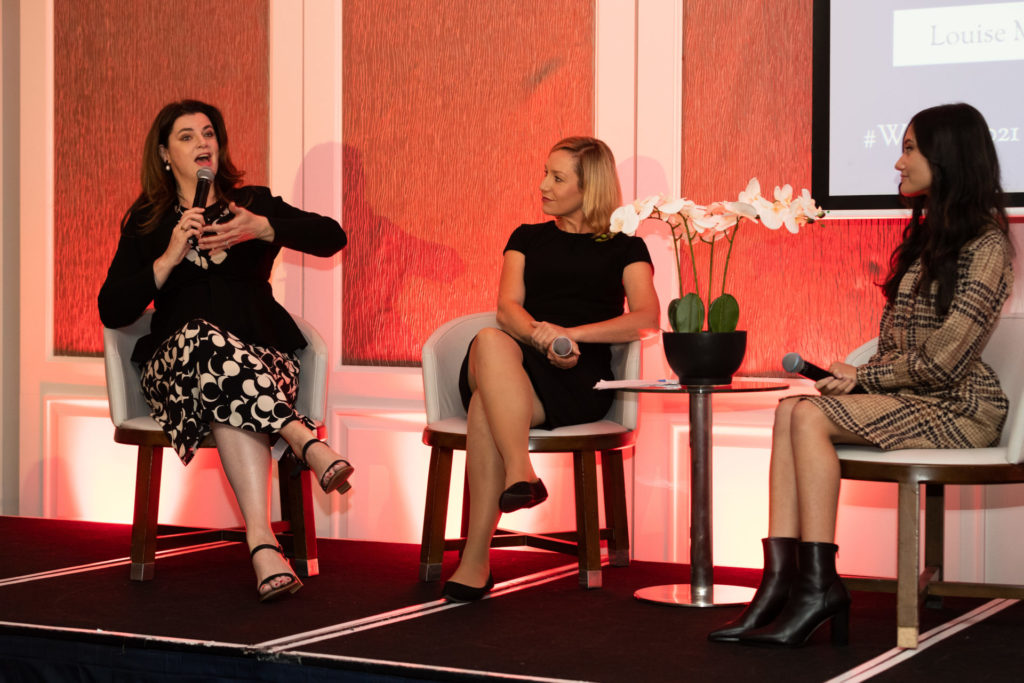Last week’s Women’s Agenda Leadership Awards saw tears, cheers, reflections of the past 12 months and lots of understandable anger.
Indeed, the last few months have seen a national reckoning in Australia, with women calling time on a long history of toxic culture, discrimination and sexual misconduct. Three powerful women, who have been pivotal to this movement, took to the stage to discuss their thoughts on what comes next.
ABC Four Corners’ journalist and author, Louise Milligan shared the stage with Greens Senator Larissa Waters and youth activist Yasmin Poole.
The panel was led by Women’s Agenda’s editor in chief Tarla Lambert, who started the conversation by asking Milligan about where she found her motivation to be at the forefront of an array of culture-shifting news breaks.
“It came from a place of wanting to shed the light in dark places,” Milligan began. “I wanted to give voice to the traditionally voiceless. I wanted an amplification of their voices,” she said.
The impetus for her most recent book, Witness stemmed from frustration at the failings of Australia’s justice system.
“Women who’ve been assaulted come out to tell their story. They are angry. They are not ashamed. And then they go through the criminal justice system and it is not a good experience,” said Milligan.
“Writing the book made me go: ‘we cannot allow this to happen these people’. We have to give voice to people, but we also have to give them a system where they can be respected and not re-traumatised.”
Milligan said that watching and hearing from the flood of women who have experienced devastating treatment at the hands of men in positions of power has been horrific, but that she remained optimistic as she looked around the room.
She mentioned young women like Madi Howarth, who gave a stirring acknowledgement to country at the commencement of the event.
“Tonight has been an emotional rollercoaster,” she said. “Madi, that was the most moving acknowledgement to country I’ve ever heard,” she said.
Larissa Waters agreed that remaining optimistic about the future is vital, in spite of the countless atrocities facing women both here in Australia and across the globe.
“Right now is a harrowing time for women everywhere,” she said. “I have to hope that there is going to be a better Australia. I have to believe that change is possible. I have to believe that we will prevail.”
Nonetheless, Waters noted that a shift needed to happen in the corridors of parliament for us to achieve lasting change.
“We still have a cabinet made up of men, who know each other from school. It’s an elite club, that are meant to be making the rules. You get such terrible decisions.”
Yasmin Poole agreed, saying that the patriarchal history of parliament affects a woman’s decision to feel safe in the space but to also achieve effective policy change.
“What I found interesting was the way Scott Morrison was scrambling to try to understand the right politically correct answer,” she explained, referring to recent events in which a slew of Liberal Ministers were accused of misconduct toward women.
“It made me think about how, with every policy, it is always a process of interpretation, through our own eyes, and through our own lens and through our experience, and it’s exactly the product of a culture that has for so long been dominated by male voices.”
“You go to parliament and look at the portraits. That’s just one visual indicator of how women have been excluded from this space”, she said. As an agitator of cultural change, Poole said she even questions her own safety sometimes in doing what she does.
“It’s even hard for me to say to myself whether I would be kept safe if I went into parliament and that’s really confronting because that’s been the majority of my work so far; but it’s exactly why that lens of experience and knowledge is important.”
Milligan urged Australians to keep going, to maintain momentum and ensure the government knew the changes that women in Australia expected to see.
“It’s one of the things we see as journalists; everything’s very hot for a while and then it just sort of fizzles out and then it’s on to the next issue,” she said.
“I think it’s really up to members of the public to continue to put the pressure on and to not accept anything less. Come and talk to me about it and talk to other journalists about it, and keep raising consciousness about these issues because we all know they’re not going away,” she said.
For Poole, a critical part of achieving headway will only come from listening to and learning from Australia’s younger generation– particularly young women.
“When we think about policy, women, and especially young women, are kept as a footnote in the conversation. We’re kind of pushed to the side– gender issues are just a small part, maybe not even considered at all,” she said.
“We really needed a gender responsive budget and we didn’t get that, and I think that’s absolutely vital, because it means that any party of any political persuasion should have to confront and think about gender issues.”
That’s a key part of any meaningful progress.


